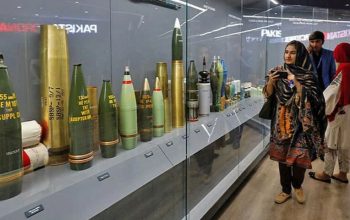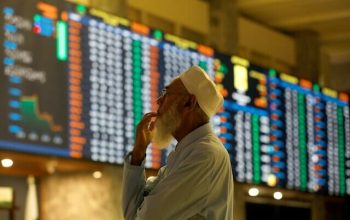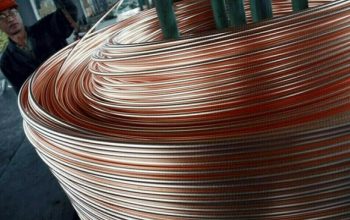As the year comes to a close and 2023 begins, the nation takes a reflective pause and harks back at a long year of political events that will foreshadow the election year – a new year resolution politicos hope to keep but without an economic story worth telling.
Unprecedented events lashed the political waters to madness as the stakeholders tried to steady the ship amid a chorus of downbeat predictions of the country’s economy facing a vertiginous collapse.
In what appears to be the country’s closest brush with nightmarish default, the ruling parties found themselves bankrupt, both financially and intellectually, to stop the tiger it held by its tail.
Yet, there was hope against the hope. To borrow from Chairman Mao, “there is great disorder under the heavens and the situation is excellent”: the erosion of the old order offered the opportunity to build a new one. However, this will be subject to certain conditions embedded in the byzantine arithmetic of the country’s complex power balance.
The year 2022 would go down as one of the most tumultuous years. From a ‘hybrid system’ falling under its own weight to a parliamentary revolt that continued to hobble the incumbent dispensation, to a new government coming to power only to increase the popularity of the previous one and an outgoing military chief confessing about military’s involvement in politics for over seven decades and made a promise on behalf of the powerful quarters that they would stay away from doing it in the future.
Since the change of government in April, the parliament remained dysfunctional, assemblies were on the verge of being dissolved, terrorism reared its ugly head yet again, and political turmoil kept intensifying with each passing day, hurting the economy.
Amid all of this, it was the year of the rise of the populist narrative and the PML-N-led ruling alliance tried its best to avoid snap polls; even local bodies elections after seeing PTI’s winning streak in by-elections and got itself labelled as the one running away from polls.
Throughout the year, the political elite failed to agree to play by any rules of the game and virtually indulged in the futile exercise of barking up the wrong tree in the absence of any rules.
Disbelief, darkness and despair dominated the year; elections being a matter at the heart of democracy and the national poll body tasked to conduct them were discredited to the extent that allegations propagated so often at rallies, during press conferences and on social media by PTI leadership have now cast a long shadow on whether people can rely on elections to ensure a peaceful transfer of power whenever elections are held.
Who really rules the country?
From calling the mighty establishment an animal for staying “apolitical” while a superpower allegedly orchestrated a regime change operation to shocking audio leaks of the Prime Minister House and to putting a lid on corruption cases through legislation by the ruling alliance, the country went through economic turbulence without much help from the global lenders and friendly countries.
Meanwhile, the people were left to bear the brunt of rulers’ failed policies that resulted in a historic inflationary storm, jacked up petroleum prices, and devalued the rupee, among other things.
The assassination attempt on PTI chief Imran Khan was another dark chapter of the previous year, which ratcheted up the debate about powerful people’s roles and brought back attention to the core question: who really rules the country?
For the first time in the history of Pakistan, the nation witnessed an unprecedented press conference by the spy chief, lambasting the PTI chairman and party leadership over their dual standards, saying that Mr Khan called the then military chief a traitor “during the day but meets him in the dark of night behind closed doors” to express his constitutional and unconstitutional wishes.
He shocked the nation by revealing that the army chief had received an offer in March for an “indefinite extension” in service when Khan was still in government and wanted to avert a no-confidence move.
Almost half of the year was wasted by the political rivals wrangling on who should be the next army chief. Finally, the government prevailed in an entirely unnecessary crisis-like situation.
Moreover, the blame game dominated the political landscape. Though the government lacked a clear plan to tackle economic woes, rallies, long marches and ultimatums after ultimatums by PTI in an attempt to force elections on the federal government didn’t provide much space for stabilisation in almost all spheres.
Meanwhile, Imran and his party were grilled in the prohibited funding case and the submission of an “incorrect declaration” about Toshakhana gifts he received from foreign dignitaries during his tenure as the prime minister led to Imran’s disqualification by ECP; the legal matter along with other things will now enter the new year.
Like previous years, chiding the opponents remained the favourite sporting activity of the politicians and the notion of sitting across the table for the greater good of the country remained a distant dream for yet another year.
Hardly anyone cared about roughly 33 million flood-affected people across the country as the focus was largely on optics rather than actually providing relief to the people, who are now going through a harsh winter. Lengthy telethons by PTI and frequent aerial visits by the PMLN-led ruling alliance didn’t change much for the people surrounded by water for as far as the eye could see.
End of the 'hybrid system'
“The year’s biggest development was the change of the government and ousting of a prime minister through a vote of no-confidence for the first time in the history of Pakistan but an even bigger development behind this event was the end of the hybrid system; that was the real event,” said renowned political analyst Zaigham Khan.
Zaigham, who is an anthropologist and development professional too, said that the experiment of a new kind of hybrid system, which started somewhere around 2012 and through which a populist authoritarian regime where a populist political party supported by the establishment, was shaped up and in this system there was extremely limited space for the opposition, human rights and civil society.
“It came to an end because the military finally decided that it was too much burdensome for the institution, country, economy and they couldn’t carry on with the experiment,” the expert said. Because of this change of heart, he said, PTI’s allies left it, the PTI government ended and a new government came into power.
“2022 was very significant in a few respects,” Pakistan Institute of Legislative Development and Transparency (PILDAT) President Ahmed Bilal Mehboob said, “most significant, in my opinion, was the confession of a sitting (now former) COAS of unconstitutional interference in the political affairs of this country for the last 70 years and the pledge on behalf of the entire Army not to interfere in future.
The PILDAT chief hoped that the pledge is kept and our political class also acts responsibly to undertake their functions honestly & competently.
For Mehboob, the vote of no confidence against ex-PM Imran Khan was the second most significant event, saying it was an “ill-advised move” which triggered political and economic instability in the country. He said that it needs to be explained by political leaders of PDM what or who prompted them to remove IK towards the tail end of his term instead of a normal transition.
Eminent scholar Professor Dr Hassan Askari listed the change of the government, increased but unnecessary political confrontation, faltering economy and rising terrorism as some of the key developments of the previous year, saying the country managed to avoid default because of the external support as it is “surviving on charity” last year.
Among other things, the professor emeritus pointed out that the decision-making of the new government was slow, especially regarding the army chief’s appointment, and that hurt the economy and the country.
To a question about the hybrid system, Askari opined that the hybrid system has not yet ended as the military is still a powerful institution. He pointed out that the forces choose to retreat a little sometimes because of the peculiar circumstances but that doesn’t mean that they can’t assert themselves.
The professor said that criticism of the military was unprecedented in 2022 but only two people, Shahbaz Gill and Azam Swati, have so far been targeted. Though he didn’t mention but MNA Ali Wazir has long been behind bars and the year 2022 wasn’t any different for him than the preceding year.
Throughout the year, political decisions and indecisions hurt the country both ways; the IMF program got suspended in the last few months of the PTI government because the then finance minister Shaukat Tarin and Imran Khan on a populist basis went to an expansionary economy, which ballooned the current account deficit to an unsustainable level of 18 billion dollars.
Risk of default
The new government came and took several emergency measures; ex-financial czar Miftah Ismail took some tough decisions; but then again PML-N decided to call back Ishaq Dar to contain the political damage through some populist measures, but those decisions hurt the economy again.
“Pakistan’s politics is hurting the economy, populist politics is hurting the economy and the elites’ interests are hurting the economy,” Zaigham said. He gave an example of failure to impose a tax on traders, saying Imran couldn’t do it and when Miftah tried, PMLN leader Maryam Nawaz intervened through a tweet and that decision was taken back.
Now, he said, IMF has once again asked to increase taxes and noncompliance with IMF is increasing the risk of default.
“Pakistan’s power elite, political parties, economic elite and establishment are all responsible for the crises we are in and facing in the next year. The situation was brewing for quite some time; like three decades but particularly the last seven years were really bad as the economy was massively mismanaged and the power elite failed to evolve any rules of the game following the period when a charter of democracy was reached by politicians bringing stability for a brief period before it was thwarted.
Once again political parties are bickering about the rules of the game, which leads to political and economic crises time and again. “It’s all about rules of the game; the constitution is the largest rule of the game but norms are also part of the rules of the games,” Zaigham said while pointing out that the problem was that the elites were interested in other things and because of it the focus moved away from terrorism as well and Pakistan was now facing the third crisis — political, economic and terrorism.
2023 Predictions
In the next year, Mehboob said, a lot will depend on how the military establishment conducts itself in the context of political affairs. “I am concerned that ECP is being cornered by various court decisions like the reversal of punitive actions taken against the officers who had committed irregularities in Infamous Daska by-election,” Mehboob said, saying this is a profound development which will greatly and adversely impact the prospects of fair elections in future. Sadly, he noted, there is very little appreciation of this development in the media and society.
He added that the court also reversed the ECP decision just 10 days before the LG election in Islamabad after the federal government passed a law to increase the number of union councils so close to the election to disrupt the LG election.
“The worsening law & order situation due to terrorist activities of TTP and Baloch separatists will play a very important role in shaping events next year,” Mehboob said, adding it is important that the country makes a successful and orderly transition to the next general election in 2023.
For Professor Askari, the populist narrative of PTI thrived in 2022 because the incumbent government didn’t perform well, saying Imran’s position was extremely weak back in April and May but then he recovered because of the new government’s inability to recognise problems.
In 2023, Professor Askari was hopeful that the issue of terrorism would be contained as, like in previous years, the army would be dealing with the issue and there will be little role of the political elite. He, however, feared that economy could deteriorate further.
“Present political elite is inimical to economic problems,” Askari said, saying the parliament remained dysfunctional and the issue of PTI MNAs’ resignations was enough to show the seriousness of both sides. He admitted that Imran was highly popular right now but predictions about elections are made on the basis of the last three months before the elections as any guesses made today could change later on.
Zaigham said that 2023 looks like a very difficult year, perhaps, more difficult than 2022 because several tough decisions will have to be taken. It’s quite evident that the rupee would further fall; it will increase inflation; and Pakistan will have to go for rescheduling of its loans.
He thinks it’s going to be a difficult year for Pakistan, hoping that country’s power elite finally sits together and puts things on the drawing board again and thinks about the country’s future because it’s going to be an election year.
Regardless of what the experts say, the situation in Pakistan was no different in 2022 than what Charles Dickens had described in his book — A Tale of Two Cities — decades ago:
“It was the best of times,
it was the worst of times,
it was the age of wisdom,
it was the age of foolishness,
it was the epoch of belief,
it was the epoch of incredulity,
it was the season of Light,
it was the season of Darkness,
it was the spring of hope,
it was the winter of despair,
we had everything before us, we had nothing before us, we were all going direct to Heaven, we were all going direct the other way — in short, the period was so far like the present period, that some of its noisiest authorities insisted on its being received, for good or for evil, in the superlative degree of comparison only.”
Read the full story at the express tribune website.


